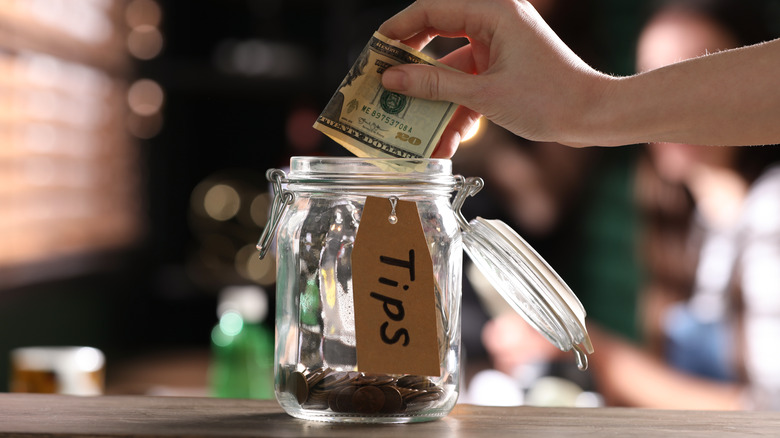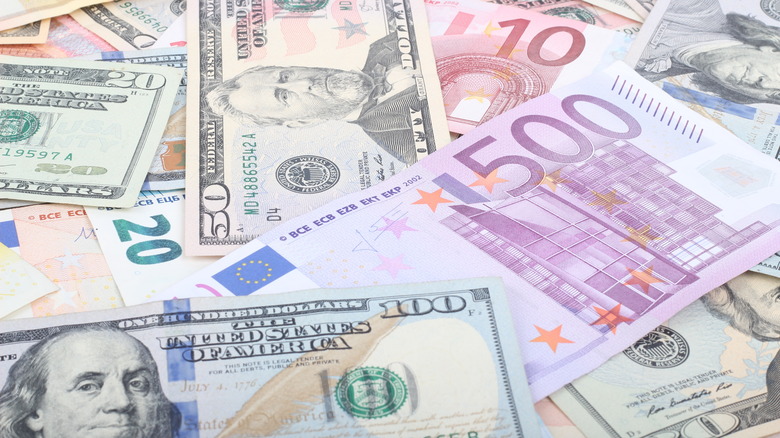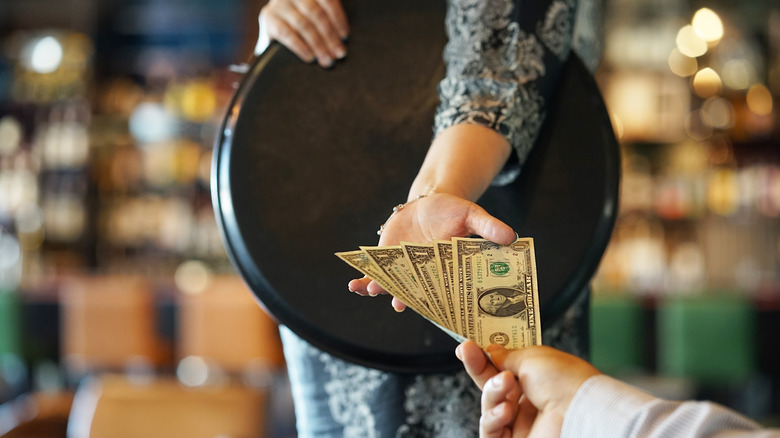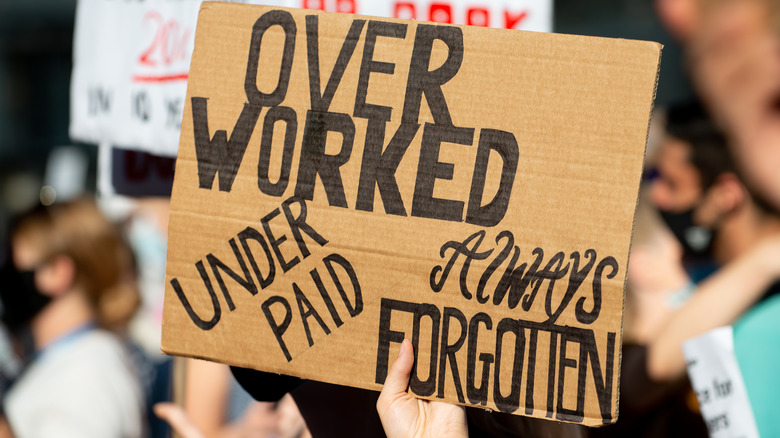The Controversial History Behind Tipping
Perhaps you've heard the word "tip" is an acronym that stands for "to insure promptness." While it's true that in 17th century London coffee houses there were boxes for patrons to throw in money before getting served, the word "tip" has a more nuanced history (via A Movable Feast: Ten Millennia of Food Globalization). The word's actual origins stem from an unsavory crowd of hustlers, beggars, and thieves, reports Today I Found Out; the first usage of the word appeared in 1610 as a slang word meaning to share or give.
Not more than a hundred years later, the word spread to more civilized masses and used to denote money handed over as a bonus for services received. In modern times, tipping has become an automatism of dining culture, even when diners are unsure exactly how much to tip. The history of tipping, however, is a bit more controversial than one might think.
European origins of tipping
Ironically, while most present-day European dining cultures lack a tipping culture, some believe the practice of tipping originated in medieval Europe. According to New Scientist, there are multiple tipping theories attempting to pinpoint the exact creation of the practice: either the Romans invented tipping, medieval feudal lords handed over money to reward the steadfast service of a serf, or wealthy British households gave servants money payments after guests came to visit. No matter which origin story is true, we can have rich Americans to thank for bringing the tipping tradition to the New World in the 19th century.
For those well-off Americans, the only thing better than being wealthy was being aristocratic. Adopting the act of tipping was an easy way to emulate entitled — and titled — European counterparts, regardless of whether or not tipping at a fancy restaurant was involved. Obviously, the practice stuck.
History of tipping in America
According to Time, those of a higher class and blessed with thick wallets tipped freely and happily in America; meanwhile, however, the rest of the population was against the idea of giving money to someone for no reason. Some diners decried the behavior as a classist, demeaning act and thought it was an unreasonable expectation to place on poorer Americans who could barely pay the price of food itself. An anathema in post-Civil War America, tipping was commonly described as "offensively un-American" because it was seen to pollute democratic and anti-aristocratic ethics (per NPR). Iowa, South Carolina, and Tennessee tried to legally abolish the practice, but these laws were repealed by 1926 (via The New York Times).
The wave of anti-tipping sentiment was so strong that it rippled back across the Atlantic to Europe. As a result, a 15% service fee is already baked into European menu prices, and some quick-service chains have tried to use a similar approach to recruit employees.
A questionable beginning
Once slaves were liberated, if they did not become sharecroppers they were still limited to positions of service such as waiters, servants, and porters. If one were a restaurant worker or a railroad porter, they were not even guaranteed pay through their employers because they were offered the condition that guests would provide tips as compensation. Saru Jayaraman, the president of the Restaurant Opportunities Centers United, described this payment structure to Time as a way to extend slavery.
Despite its initial unpopularity and legal attempts to put the kibosh on tipping, this payment structure was seized upon as a way for restauranteurs to avoid paying staff higher wages. In 1938, tipping was cemented into law with the Fair Labor Standards Act, ensuring a federal minimum wage but excluding restaurant and hotel workers — thus protecting the practice (via On Labor). Even Eleven Madison Park brought back tipping after trying to do away with the practice.
Tipping controversy continues
During the pandemic, CNBC reported that restaurant owners observed tipping standards increase, reporting more generous tips even for takeout orders. One recent study found that tips for delivery increased, but as operations return to normal, diners are tipping less than before the pandemic.
Shake Shack founder and entrepreneur Danny Meyer made headlines when he announced a no-tipping policy in his empire of 13 restaurants, a bold move that resonated with many Americans (per The New York Times). A few independent restaurants followed suit, but by 2018, the no-tipping movement lost momentum and many restaurants returned to tipping (via Eater). The reason? Grubstreet reports higher prices on menus were off-putting to customers and many front-of-house staff were quitting due to lower salaries. In 2020, Meyer publically reneged his controversial stance, citing fear of denying restaurant workers extra compensation in times of an economic crisis. It seems that despite tipping's torrid history, the model is set to stay.




